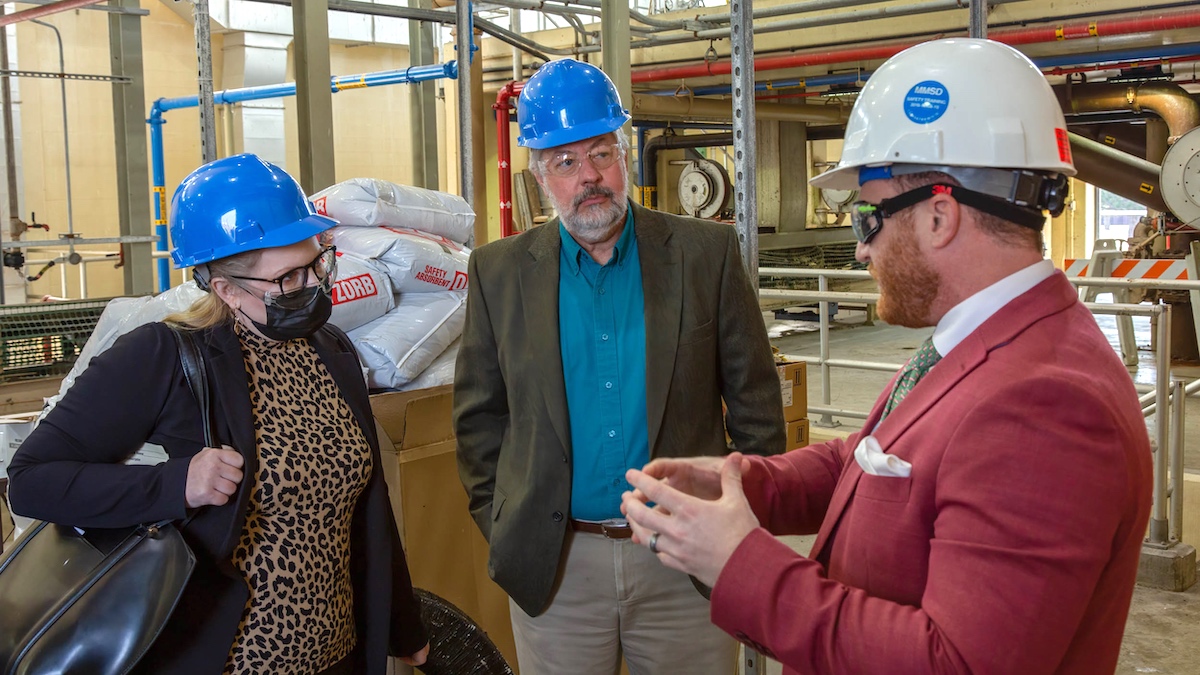
This article appears as part of This Week in Milwaukee Rising, a weekly newsletter from Technical.ly highlighting the innovators bringing a more just, equitable and dynamic Milwaukee economy. Subscribe here. The series is underwritten by American Family Insurance Institute for Corporate and Social Impact.
Surprise: A city so known for its beer is also the freshwater technology capital of the United States, and home to one of the most mature water tech hubs in the world.
That would be Milwaukee and The Water Council, a nonprofit committed to solving critical global water challenges by driving freshwater innovation and advancing water stewardship.
It’s an unexpected organization with an unexpected leader tackling a national crisis.
The art of the career pivot
Dean Amhaus, the org’s president and CEO, always planned to go into show business. After growing up in Cudahy, Wisconsin, he went on to college intending to manage a theater business and spent the start of his career in DC where he handled government affairs in arts and cultural policy. In 1990, Amhaus stepped into a leadership position at the Wisconsin Arts Board, a role that facilitated positive relationships with the state and federal government and arts organizations.

Dean Amhaus. (Courtesy photo)
Amhaus eventually became the president of Spirit of Milwaukee, a nonprofit corporation that educates the public about the city. In an effort to expand the city’s brand, Spirit of Milwaukee identified the key industries in the city. Among the more predictable industries like advanced manufacturing and financial services was one industry that had never been fully realized: water technology.
“Nobody had heard about it, nobody had discovered this,” Amhaus told Technical.ly. “It was completely new.”
While with Spirit of Milwaukee, Amhaus became more and more involved with the new idea of water technology. He and a few of the other executives around Milwaukee began working together to develop the concept and bring it to fruition. Eventually, he made a permanent transition.
“This job has plenty of water puns, but I literally fell into water on this,” he said of his lack of technical expertise. “I just got deeper and deeper involved, and at some point, you start raising some money and you say, ‘OK, what are we going to do with this?’ Somebody’s got to run it.”
Despite his lack of technical expertise, Amhaus’s experience in prior roles has led to his success. He has had a career of practice in government relations, managing boards of directors, corporate leadership and fundraising, all of which are integral to his work at The Water Council. Headquartered on the aptly named Freshwater Way in Milwaukee, the company of roughly 150 employees is led by a leadership team of 10, all of whom bring their own expertise to the table, including expertise in engineering, water stewardship and business management.
Milwaukee as water tech hub
Milwaukee may seem like a surprising choice for a freshwater innovation hub. There are other large cities along the shores of the Great Lakes that could do the job, and the Midwest does not have the same water challenges as the western states: California faces possible mandatory water restrictions amidst their ongoing drought, and the water we drink contains unknown traces of PFAS chemicals, making tap water’s potability questionable.
However, Amhaus explained that those other cities don’t have Milwaukee’s history in the brewing industry. The breweries came to Wisconsin because of its access to water, river, grains and farms, and in order to be successful, they needed companies to help them process the water to be used in their beer.
Led by this history, since its inception in 2009, The Water Council has grown into one of the only organizations like it in the world. Its main goal is to connect the innovators, large and small, with the businesses and institutions that would put them into practice — a water technology nerve center on a global scale.
For example, in early 2021, South Korean company Tomorrow Water contacted The Water Council to pilot its wastewater utility treatment technology. Per Amhaus, this technology takes the hour-long process of cleaning wastewater and brings it down to a mere six minutes in a third of the amount of space than it normally would. The Water Council introduced this technology to the Milwaukee Metropolitan Sewerage District which accepted the offer and is now in phase two of piloting the technology.

Dean Amhaus at the South Shore Water Reclamation Facility in Oak Creek. The Department of Workforce Development event that included a demonstration from Tomorrow Water, a member of The Water Council that is conducting a pilot of its technology at the facility. (Photo courtesy of the Wisconsin Department of Workforce Development)
Stewardship and the next generation
Despite the innovation that has taken place throughout its history, Amhaus knows the region still has some work to do in extending the sector’s benefits to all residents.
“Milwaukee has seen significant advancements from when I was young,” he said. “But the community still needs to make important strides on breaking down the walls that divide our diverse populations.”
The Water Council does its part through the programs it provides for the students of Milwaukee and the surrounding area, partnering with academic institutions in southeast Wisconsin to educate the water leaders of tomorrow. Those academic institutions include technical schools, four-year universities and colleges, as well as a few local high schools.
The Water Council also believes that water innovation includes a need for water stewardship, and operates a program helps companies improve their water practices. From dairies to data centers, all types of businesses are accountable for how they impact water and how they will apply credible strategies for improvement.

Dean Amhaus at the annual convention for the Water Environment Federation. (Courtesy photo)
Amhaus is seeing the need for these technologies as the water crisis in the country grows worse. As he puts it, water is the “canary in the coal mine” when it comes to climate change: “It’s the first indicator, and you can see that by the rivers drying up you can see that by the droughts, you can see that by the floods. It should be the marker out there.”
Amhaus and The Water Council ultimately have one goal in mind as they move through the work: to leave the world in better shape than it was when they came into it. Cheers to that.
Subscribe to This Week in Milwaukee Rising:
Join the conversation!
Find news, events, jobs and people who share your interests on Technical.ly's open community Slack

Delaware daily roundup: Delmarva Power vendor stats; DelDOT's $15M federal grant; 50 best companies to work for

Delaware daily roundup: Over 4,000 Black-owned businesses uncovered; Dover makes rising cities list; a push for online sports betting

Philly daily roundup: East Market coworking; Temple's $2.5M engineering donation; WITS spring summit


